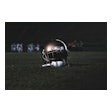Copyright 2018 Boston Herald Inc.
All Rights Reserved
The Boston Herald
Some years ago I fell into a passing acquaintance with several rugby players. They were born to the game, in Britain or elsewhere in the Commonwealth. In America, they had taken up club rugby in a league populated by young Americans who had grown up playing American football.
The native-born rugby players weren't fond of playing with Americans. American boys learn their tackling techniques behind the fortification of a hard-plastic, reinforced helmet and a formidable set of shoulder pads. They are often taught to use their whole bodies as weapons, a technique they do not readily unlearn simply because they no longer have the protection of a helmet.
Rugby is a rough game in its own right, but the only protection that I've seen its players use are mouth guards and a peculiar configuration of pads and straps worn over the head to protect from cauliflower ear.
Rugby players make hard tackles, but without protective equipment the tackler learns to protect himself, and the tackled player is safer, as well. In fact, if we really want to make American football safer, we'd provide our players with less protection rather than more.
That's unlikely, but rugby-style tackling may be coming to American football. Last year Texas became the first state to implement a mandatory tackling certification program for its football coaches, and last week the state University Interscholastic League and the Texas High School Coaches Association announced that Seattle-based Atavus Sports has been hired to administer the certification program, beginning this year.
Atavus Sports promotes a tackling style adapted from rugby, which emphasizes form and technique over the use of the body as a headfirst projectile. The head is kept out of the way. At the heart of Atavus' marketing is Tacklytics, a trademarked program that permits coaches to "evaluate your team with 88 data points for every tackle."
Within 36 hours after every game, Tacklytics provides a report that compares tackling by individual players and maintains a "tackling performance rating" throughout the season. Coaches are empowered to create "adaptive tackling plans" that help their teams "start tackling better immediately."
This sounds great. But I wonder if parents who, out of concern for their young sons' health, are considering whether to allow them to play football next fall should view this development with a skeptical, or at least critical, eye. At the least, they should keep three facts in mind:
First, if parents are concerned about chronic traumatic encephalopathy, the cumulative, irreversible brain damage that results from too many hits to the head, they should remember that a great deal of CTE is associated with subconcussive head-knocking, the kind that offensive linemen, for example, experience on virtually every play and that doesn't involve tackling technique at all.
Second, once a football play begins, the action is essentially chaotic. Attempts to create an illusion of safety by breaking dynamic chaos into component parts — Atavus' "88 data points" or USA Football's "Heads Up Football," for example — should be regarded with considerable skepticism.
An X-ray reveals the essential fragility of the neck, spine and cranium. The safety of a game that is built around very fast, very heavy and very aggressive boys and men running hard into each other can only be marginally improved by better equipment and technique.
Finally, it's worth remembering that efforts to improve the safety of football are often supported by groups that have an interest in a complacent public perception that the health problems associated with the sport can be alleviated. Atavus has a proprietary interest, of course, and so does the NFL, an important supporter of USA Football.
Parents should remember also that coaches, administrators and colleges have an interest in player safety that conflicts with other interests. Parents are the only ones who have the unalloyed capacity to decide if football is actually safe enough for their sons to play.
Read More of Today's AB Headlines
Subscribe to Our Daily E-Newsletter
Terms and Conditions Privacy Policy































